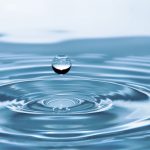 Essential nutrient class needed by the body.
Essential nutrient class needed by the body.
The ultimate source of water was an Indo-European word pronounced something like wodor, which gave rise to dozens of other words in other languages. In Greek, wodor became hudor, which gave rise in the thirteenth century to the English hydro, now used in words such as hydro-electric. In Latin, wodor became unda, meaning wave, which is the source of words such as undulate. In Russian, wodor became voda, the source of vodka, a diminutive meaning little water that entered English at the beginning of the nineteenth century. In Gaelic, wodor became the almost unrecognizable uisge, which was combined with another Gaelic word to form uisge-beatha, literally meaning water of life; later on, uisgebeatha evolved into whisky bae, which entered English as whiskey in the early eighteenth century. In German, wodor became wasser, the source of vaseline, a water-based lubricant. The word water is even related to some words that might seem further afield, including otter, an animal similar to the hydra (a mythical Greek monster) in that they are both water-beasts. Even the word winter may derive from the same source as water, winter being the season when water, albeit frozen, accumulates on the ground.
Chemical formula is H20. The human body is mostly and it is necessary for all the chemical reactions that take place within the body. When balance is not maintained, one of two reactions may occur: 1. edema or 2. dehydration.
The liquid essential to life which makes up a large part of the body.
Clear, colorless, odorless, and tasteless liquid; chemical formula H2O.
H20, hydrogen combined with oxygen, forming a tasteless, clear, odorless fluid.
The common term for the amniotic fluid surrounding the fetus.
The term “potato water” refers to the liquid left over after boiling potatoes. In cooking, the term “water” can also refer to the liquid used to cook pasta, rice, or other grains. As a verb, “to dilute” means to make a substance thinner or weaker by adding another substance, usually a liquid.
Water, the very essence of life, holds unparalleled significance. It stands as the principal component within the intricate tapestry of both animal and plant existence, permeating their cellular makeup. Remarkably, within the human body, water reigns supreme, comprising a remarkable two-thirds of its weight, symbolizing its indispensable role in sustaining our being.
Water is a fundamental compound vital for all living organisms. It consists of a molecular structure composed of two hydrogen atoms bonded to one oxygen atom, often represented as H2O. While water makes up roughly 99 percent of all molecules in the body, it contributes to a smaller proportion of the total body weight. Approximately two-thirds of the body’s water content is contained within cells, with the remaining one-third found outside of cells in various forms, including blood plasma, lymph, cerebrospinal fluid, and tissue fluid.
Water serves as the medium for facilitating all metabolic reactions and plays a crucial role in transporting substances throughout the body. Blood plasma is responsible for distributing water to all body tissues and removing excess water from tissues for elimination via the liver, kidneys, lungs, and skin. The movement of water in and out of cells within tissue fluid occurs through a process known as osmosis.
The body obtains water through the consumption of food and beverages, and it is eliminated through urine and feces, as well as by releasing water vapor through exhalation and sweating. The kidneys play a pivotal role in controlling the quantity of water excreted through urine. In cases where there is an excess of certain substances in the blood, such as sugar or salt, additional water is required to expel them from the body.
Certain conditions, such as kidney failure or heart failure, can lead to an inadequate expulsion of water through urine, leading to the buildup of excess water in the body tissues, a condition known as edema.
